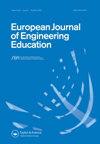开发一个评估工程专业学生可转移技能的系统:量表内容有效性和可复制性的证据
IF 2.8
Q2 EDUCATION & EDUCATIONAL RESEARCH
引用次数: 0
摘要
过去的研究表明,对工科学生可转移技能的评估没有得到适当的调查,也没有纳入高等教育机构的实践。本研究通过提出工程学生可转移技能评估系统(SACTEE,葡萄牙语)解决了这一差距,该系统包括自我评估、同伴评估和教师评估的量表。本研究还试图为量表的内容效度、内部一致性和可复制性提供证据。为了保证量表的内容效度和内部一致性,共有147名学生、23名教授和8名教务管理人员代表参与了研究。由巴西公立和私立高等教育机构的15名代表组成的两个确认性焦点小组分析了该系统的实用性和可复制性。实验结果证明了该仪器的初步心理测量质量和SACTEE的可复制性,从而为工程教育研究领域以及评估和发展学生的可转移技能做出了贡献。本文章由计算机程序翻译,如有差异,请以英文原文为准。
Developing a system for assessing engineering students’ transferable skills: evidence for the content validity and replicability of the scales
ABSTRACT Past research has shown that assessments of engineering students’ transferable skills have not been properly investigated or incorporated into the practices of higher education institutions. This study addressed this gap by proposing a System for Assessing Engineering Students’ Transferable Skills (SACTEE, in Portuguese), which includes scales for assessment by self, peers, and teachers. The study also sought to provide evidence of the scale’s content validity, internal consistency, and replicability. A total of 147 students, 23 professors, and 8 representatives of the academic management staff participated on the study to assure the scales’ content validity and internal consistency. Two confirmatory focus groups with 15 representatives from public and private HEIs in Brazil analysed the usefulness and replicability of the system. The results demonstrated the preliminary psychometric quality of the instruments and the replicability of the SACTEE, thus contributing to engineering education research field and to assessing and developing studentś transferable skills.
求助全文
通过发布文献求助,成功后即可免费获取论文全文。
去求助
来源期刊

European Journal of Engineering Education
EDUCATION & EDUCATIONAL RESEARCH-
CiteScore
7.30
自引率
13.00%
发文量
64
期刊介绍:
European Journal of Engineering Education is published six times a year in print and electronic editions and provides an essential forum for dialogue between researchers and specialists in the field of engineering education, at European and worldwide levels. European Journal of Engineering Education is the Official Journal of SEFI, the Socièté Européenne pour la Formation des Ingénieurs (the European Society for Engineering Education). SEFI is a non-governmental organization whose aims are to develop information about engineering education, to improve communication and exchange between professors, researchers and students and to promote cooperation between the various institutions concerned with engineering education.
 求助内容:
求助内容: 应助结果提醒方式:
应助结果提醒方式:


